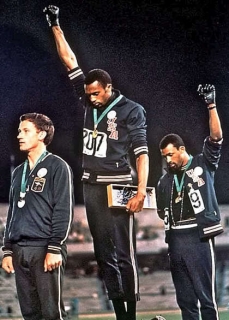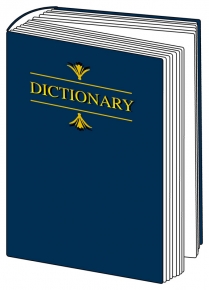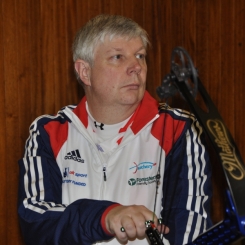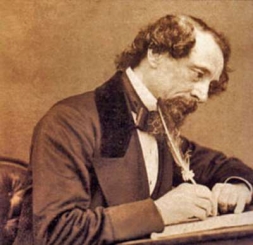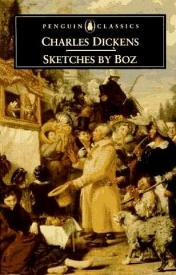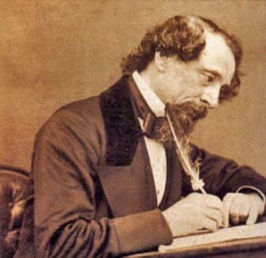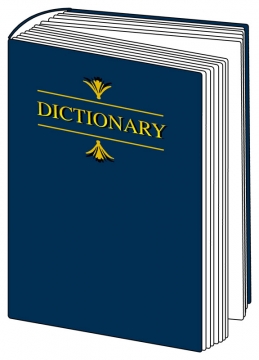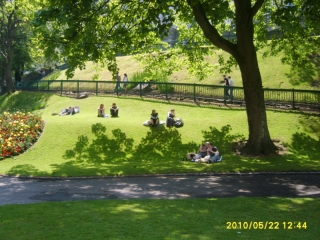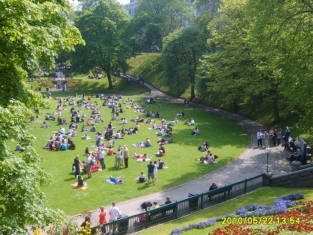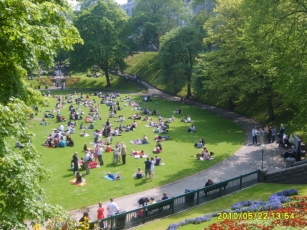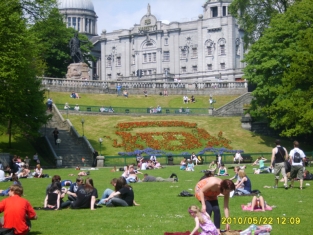Aberdeen Voice’s Old Susannah can barely contain her excitement over the imminent Olympics, and reviews the week’s past local events. By Suzanne Kelly.
Yet another exciting week in the Granite City has just passed. I had a great weekend with Anthony Baxter, the Milnes, Susan Munro, photographer Alicia Bruce and more at the Belmont on Saturday.
Baxter’s award-winning documentary, You’ve Been Trumped has returned, and at the Saturday evening show Menie residents and director Baxter did a lengthy Q&A session. I enjoyed the additional footage on the windfarm controversy and other updates. The film still makes me angry, it must be said.
Oddly the residents have a completely different take on what is going on at the estate than the Shire’s Clerk of Works – I wonder why?
If you’ve seen the film you will remember shots of trees being buried in a giant excavation. The Clerk wrote to me months back and advised that this hadn’t happened. So there. I sat next to David Milne during the screening; we are both amazed at the unprecedented way this documentary is doing the rounds. Next stops are New York and LA.
Don’t bother looking for any news of You’ve Been Trumped’s return or its many awards in the local press: you will be searching in vain. If however you want a nice picture or two of Ivanka Trump, you’ll be well rewarded. We are all as good as rolling in money and new jobs now, I’m sure.
Sunday was a great day to visit Willows; Sandi Thom performed a lovely acoustic set in a barn packed with peacocks, peahens, cats and people of all ages. I like her voice, I hadn’t appreciated her guitar skills until I saw her play. You can’t fake it unplugged with an acoustic guitar. Even the animals were attentive. The Willows is a wonderful place to visit – and a great place to support.
Later in the week Old Susannah and Aberdeen Voice editor Fred met with some legal consultants. Do watch this space, particularly if you’ve ever had doubts about the legality of some of the previous Aberdeen City administration’s decisions. I even had a nice long chat with a councillor or two about some of the issues of the day. There may be some developments coming in the near future.
Tomorrow there is an event in Union Terrace Gardens. In the words of Dorothy from Common Good Aberdeen:
“There is to be a very interesting and moving event taking place in Union Terrace Gardens this Saturday, 21st July 2012 at 2 p.m. T.A.C.T. Bereavement Support are to hold their service of remembrance for loved ones, with a Book of Remembrance being opened. Quiet observation and reflection would be the order of the day, and what better place to have it. Common Good Aberdeen will be there to support in the form of helping with the afternoon tea.”
Hope to see you there.
Despite all the running around and events, I’m managing to stick to the diet programme I’ve been put on by Temple Aesthetics. It is called the Alizonne diet, it seems to be working a treat, and I do get a variety of flavours in the meals I eat on this plan.
The problem is, my visits to BrewDog are out for now (unless I go there and drink water and coffee – and with the best willpower in the world, I’m not sure I could do that just yet). Still, I’ve lost 5½ pounds in the first week. I hope to be back to normal eating habits soon. And normal drinking habits too.
This week I have to admit that I got a bit jealous of the lucky few who attended the opening of Trump’s golf course at Menie. I’ve had a look at the goody bag they took away.
Wow. Not only did I miss out on the free toothpaste (I think that’s what I saw) and golf goodies – but I have to do without an embroidered baseball cap as well. Shucks. It was clear that this collection of goods was put together by an imaginative billionaire with the highest standards of class and taste.
Even though I didn’t get an invitation or a bag myself (I wonder why?) I will still try and get ‘Trump’ baseball caps for Anthony Baxter and the Menie estate residents; I’m sure that will make everything seem better.
But let’s move on with some definitions.
Miscalculate: (verb, Eng.) to incorrectly estimate a quantity or a situation; to fail to appreciate all relevant variables when making decisions.
For all those Olympic fans out there (I presume there are some, even though there is evidence coming in to the contrary), it seems that a few little errors of judgement may have been made. These involve the demand for tickets, and the all-important security arrangements.
Firstly, despite our Prime Minister pleading with us to agree that the games are great for the UK (he doesn’t want us to call them the ‘soggy’ Olympics, we should think of these as the Great Olympics; do make sure you think accordingly), not all of us seem to be keen on the games. The football matches, which we have all dreamt of for years, are not exactly selling tickets quite as quickly as expected.
This minor miscalculation means that sales have been overestimated by around half a million tickets, depending on who you talk to. The BBC has this to say on its website:-
“Organisers said there had been around one million football tickets left but these have been cut in half by reducing capacity at stadiums. A spokesman for Locog said: “We are planning to reduce capacity across the venues by up to 500,000 tickets across the tournament This will involve possibly not using a tier, or an area of a ground, in some of the venues.”
I hear they might want to hold one of the games in my back garden to cut costs. Old Susannah is no economist of course, but if there are one million football tickets left unsold from an event that was supposed to make tons of money, does that mean we might not make quite as much money as we thought? Even if the tickets were £1 each (they were not), that is one million pounds less than expected.
G4S, has said that it ‘regrets’ taking on this contract. I’m sure they do.
But I don’t want to be negative. I guess people are skipping football tickets in favour of the more important, exciting events, like women’s 10k three legged race or the men’s McDonald’s hamburger eating contest.
I am sure the sponsors won’t mind a little bit that a few million people less than expected will be there to look at their logos and be impressed at sponsorship for the events.
The other wee bit of miscalculation seems to involve how many security personnel would be needed. After all, we have to make sure that no one is allowed to bring in their own food and drink to the stadium village; the sponsors would be up in arms, and sponsorship is what the games are all about.
It seems that the firm that won the security contract have got their sums wrong, and every able-bodied police person in the UK is being told that they must go down to London to help out.
Don’t worry about the crime issues locally or the cost to the taxpayer: Cameron has already explained that the Age of Austerity will last until 2020. If we have to stump up a few million pounds in police overtime, and the rest of the UK is hit with crime waves, it’s a small price to pay for finding out who is the best 50 yard dash runner in the world.
The firm which altruistically won the work for Olympic Security, G4S, has said that it ‘regrets’ taking on this contract. I’m sure they do. Having only secured a contract worth an estimated £57 million or more, depending on who’s doing the calculations, or miscalculations, they can hardly be blamed for small hiccoughs.
They might not have hired enough people, not arranged sufficient training or obtained uniforms, offered salaries below industry standards, but they couldn’t have been cutting any corners for reasons of profit. After all £57 million doesn’t go nearly as far as it used to; it would barely get you half of a Granite Web.
The Home Office, which usually gets everything perfect, has also fallen a bit flat. They had no way of knowing that lots of people from around the world would be coming to compete in London. If the occasional terrorist suspect has got through the Border Agency without a hitch, I guess that’s fair enough. I will try and remember that the next time I see a granny or a little child being body searched at the airport.
Tom Smith says economist Mackay just doesn’t understand economics. Good enough for me.
These little miscalculations demonstrate that this kind of thing can happen to anyone. Except that it will not happen with the Granite Web. We don’t exactly know what’s proposed to go in the gardens. We don’t have any working drawings available to the public showing how the ramps over the gardens will be safe, but they will of course have to be enclosed, barbed wire being a cost-effective solution.
We don’t know what the negative impacts will be on the existing city centre businesses, as the streets are clogged with construction vehicles and construction dust, if the thing is allowed to go ahead. If only there were some other Scottish city that had started an open-ended civic project using many layers of public/private companies, then we could get a handle on the potential problems. But I can’t think of a single example.
Failing that, we must rely on PriceWaterhouseCooper’s projections of 6,000 totally new jobs appearing and £122 million pouring into the city every year until 2023. It all sounds so precise, doesn’t it? Of course there was some economist named Mackay, but Tom Smith says economist Mackay just doesn’t understand economics. Good enough for me.
So, since the economy is in such great shape, this is a great time to take an Olympic-sized leap of faith, get rid of the city’s only lungs, the UTG trees, clog the streets with construction vehicles – and of course borrow £92 million to pay for it. It could all either go vastly over budget like the trams in Edinburgh, or turn out to be not quite as lucrative as £122 million flowing in per year.
The Olympics overstated the financial gain case, but this is Aberdeen: the web will be a profitable, problem free project built to budget and completed without a hitch in no time at all, not like these amateurish cities London and Edinburgh.
Same Sex Marriage: (mod. English phrase) Situation in which two consenting adults of the same sex agree to enter into a marriage contract.
Readers of a sensitive disposition might wish to stop reading. This will be a shock, but there are people out there who apparently are not heterosexual. Some of these people want to have long-term, legally-recognised partnerships or even marriages with their beloveds. Clearly this is wrong.
The SNP were going to consider this issue, but have developed cold feet. And too right. What kind of a society would we have if people who loved each other could get married as they wanted? Let’s stick to what we know works – a society where some six out of ten marriages end in divorce and separation.
Actors are exactly the kind of people who go in for this kind of wild behaviour
On what the kids call ‘social network’ websites, there are a number of protagonists claiming that it should be their right to choose who to be with. Top among these is one Mr George Takei. He may be remembered for his role as ‘Sulu’ in Star Trek television and film appearances.
Actors are exactly the kind of people who go in for this kind of wild behaviour. Elton John too has a ‘same sex’ partner. Just because they are intensively creative, intelligent, witty, generous men who have entertained millions for generations is no reason to think this kind of thing won’t mean the entire breakdown of society, or even the planet.
It is clearly our business what consenting adults get up to, so let’s put paid to any same sex marriage ideas here in Scotland – Scotland, arguably the home of modern philosophy, invention and upholder of the Rights of Man. Next thing you know, we’ll have men going around in skirts. God forbid.
Confidential to a certain councillor
I am very glad to know that you are having doubts about the private companies set up to carve up the Common Good land of Union Terrace Gardens. You have confided that you are not sure the financials stack up, and you wonder if this isn’t either a vanity project, or a ‘jobs for the construction boys’ deal.
As you have those doubts, you will have to err on the side of caution, and reject any plans to start any project over UTG at this time. If you vote to go ahead, you are going against your own better judgment. I am glad you have these doubts – and as long as there is any doubt, the project must not proceed. Don’t listen to me: listen to your own common sense.
Next Week: Old Susannah wants your gift suggestions for Ian Wood’s retirement. What do you give the billionaire who has everything?
- Comments enabled – see comments box below. Note, all comments will be moderated.

